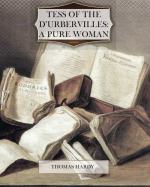|
This section contains 1,528 words (approx. 6 pages at 300 words per page) |

|
Do You Think That Hardy's Use of Coincidence Detracts from His Artistic Achievements?
Summary: Thomas Hardy is a very intriguing writer for one simple reason: He is flawed to the extreme, and his notorious use of coincidence is a perfect example of this artistic flaw. Tess of the d'Urbervilles is saturated with coincidences to really emphasize Tess' ever-increasing plight and agony, as well as her humiliation. Hardy's use of coincidence ranges from one extreme to another: sometimes they are so subtle that they are interesting to read; mostly, they're exaggerated and laboured.
My answer to the question asked in the title of this essay could be easily summarised into the following word: Yes. Thomas Hardy is a very intriguing writer for one simple reason: He is flawed to the extreme, and his notorious use of coincidence is a perfect example of this artistic flaw. His use of coincidence ties in with his fixation with predestination, his innate pessimism and his role as an omniscient author. Tess of the d'Urbervilles is saturated with coincidences to really emphasize Tess' ever-increasing plight and agony, as well as her humiliation. Hardy's use of coincidence ranges from one extreme to another: sometimes they are so subtle that they are interesting to read; mostly, they're exaggerated and laboured. Thus, it is imperative to study each of the seven phases that comprise Tess of the d'Urbervilles and analyze the coincidences used by Hardy in each one, so...
|
This section contains 1,528 words (approx. 6 pages at 300 words per page) |

|


